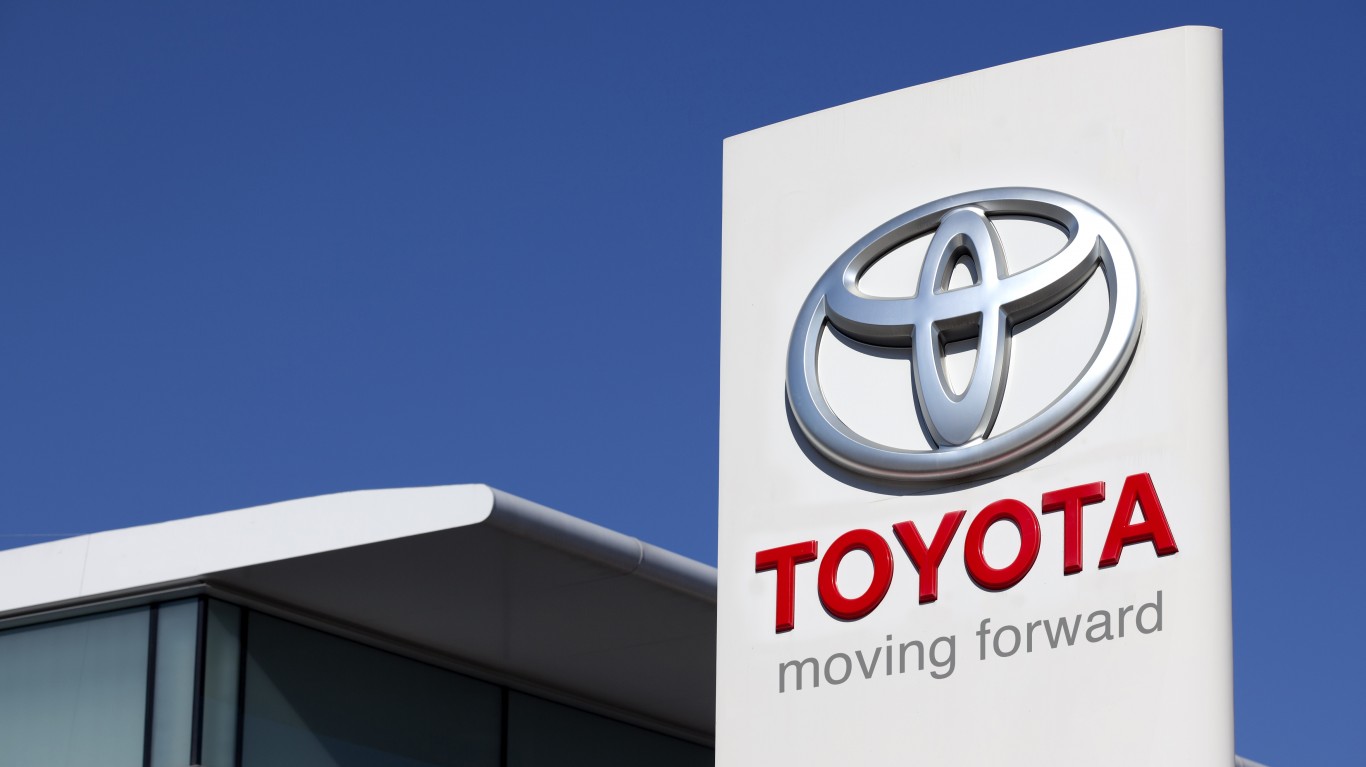
Ford Motor Co.’s (NYSE: F) prospects have been pounded by poor sales in China and worry about its electric car programs. General Motor Co. (NYSE: GM) shareholders worry it will be hurt by a softening American market. Fiat Chrysler Automobiles N.V.’s (NYSE: FCAU) prospects moving forward will be hurt by its lack of distribution outside America and teetering sales of some of its brands in Europe.
One global car company has strong sales in most of the world’s markets, and it usually holds one of the highest spots in car quality surveys. Toyota Motor Corp. (NYSE: TM) is the number one car manufacturer in its home market of Japan, is the number three car company in the United States and has a strong presence in Europe.
In its most recently reported quarter, Toyota’s revenue rose 4.5% to ¥7.3627 trillion ($65 billion). Operating income rose 19% to ¥682.6 billion.
Toyota is often noted for the balance of its sales. In 2017, it was the second largest manufacturer in the world. In the second quarter of 2018, it sold 2,236,131 units. It sold 510,339 cars and light trucks in Japan, 746,135 units in the United States, 252,639 in Europe and 394,229 in Asia. Toyota continues to make a huge investment in China. It expects its manufacturing capacity there will be 3.5 million vehicles by 2030. It sold 1.3 million units in China last year.
Another of Toyota’s advantages is its luxury car brand Lexus, which directly competes with BMW and Mercedes in many of the world’s markets. Lexus sales in the United States roughly match those of the two German car makers. Toyota may begin to manufacture the brand in China to help it into the top tier of luxury car makers there.
A reputation for high quality has helped both Lexus and Toyota. For example, in the recent Consumer Reports Auto Reliability Survey, Lexus took the top spot and Toyota took the second. The survey measured 29 brands.
Toyota has an advantage only the world’s largest manufacturers do. It builds such a wide variety of cars that it can take aim at any level of the market. It makes small, high-mileage, low-priced cars like the Yaris, which sells for as little as $16,000 in the United States. It makes midsized sedans, led by the highly popular Corolla and Camry. Each ranks among the 10 best-selling vehicles in America. It has a small army of sport utility vehicles and crossovers, from the $21,000 CH-R to the huge Land Cruiser, which can sell for as much as $100,000. Toyota also has several hybrids, which include the world sales leader Prius, and an electric fuel-cell car called the Mirai.
Finally, Toyota has the worldwide manufacturing, product development, dealer networks and balance sheets to move rapidly into the electric and autonomous car markets. Toyota management says it will have 10 fully electric cars by the middle of the next decade. Toyota has already spent $4 billion on autonomous car development.
Toyota is the most valuable car company in the world, with a market cap of $200 billion. That compares to $58 billion for Tesla Inc. (NASDAQ: TSLA) and $51 billion for GM. The market has rewarded Toyota with this value because it already has the building blocks to keep its lead not only as a huge manufacturer but also a highly successful one.
Are You Still Paying With a Debit Card?
The average American spends $17,274 on debit cards a year, and it’s a HUGE mistake. First, debit cards don’t have the same fraud protections as credit cards. Once your money is gone, it’s gone. But more importantly you can actually get something back from this spending every time you swipe.
Issuers are handing out wild bonuses right now. With some you can earn up to 5% back on every purchase. That’s like getting a 5% discount on everything you buy!
Our top pick is kind of hard to imagine. Not only does it pay up to 5% back, it also includes a $200 cash back reward in the first six months, a 0% intro APR, and…. $0 annual fee. It’s quite literally free money for any one that uses a card regularly. Click here to learn more!
Flywheel Publishing has partnered with CardRatings to provide coverage of credit card products. Flywheel Publishing and CardRatings may receive a commission from card issuers.
Thank you for reading! Have some feedback for us?
Contact the 24/7 Wall St. editorial team.
 24/7 Wall St.
24/7 Wall St.



